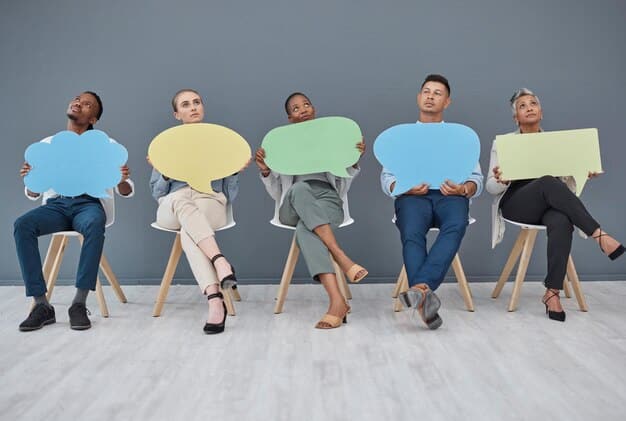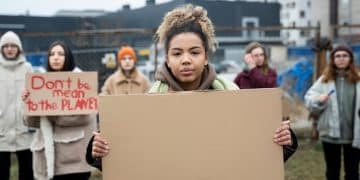Social Media & Political Polarization: Strategies for Civil Discourse

Examining the impact of social media on political polarization reveals that echo chambers and algorithmic amplification exacerbate division; however, strategies like media literacy education, cross-partisan dialogue, and platform moderation policies can foster more civil discourse.
The pervasive influence of social media on modern society is undeniable, but its role in exacerbating political polarization is a growing concern. Examining the impact of social media on political polarization: What strategies can promote more civil discourse? is essential for fostering a healthier online environment where diverse opinions can be shared respectfully.
Understanding the Roots of Political Polarization on Social Media
Social media has become a primary platform for political discourse, but it also fosters echo chambers where users are primarily exposed to information confirming their existing beliefs. This phenomenon contributes significantly to political polarization, making constructive dialogue increasingly difficult.
The Echo Chamber Effect
Echo chambers reinforce existing biases by limiting exposure to diverse perspectives. Within these closed networks, information is often distorted, and dissenting voices are marginalized.
Algorithmic Amplification
Algorithms designed to maximize user engagement often prioritize sensational and emotionally charged content. This can lead to the amplification of extreme views and the spread of misinformation, further deepening political divides.
- Confirmation Bias: People tend to seek out information that confirms their pre-existing beliefs, and social media algorithms cater to this bias.
- Emotional Contagion: Online environments can amplify emotions, leading to increased anger and hostility towards opposing viewpoints.
- Lack of Nuance: Complex political issues are often reduced to simplistic sound bites, making it difficult to have thoughtful discussions.
Combating political polarization requires addressing the underlying mechanisms that perpetuate it on social media. Understanding these dynamics is the first step toward developing effective strategies for promoting more civil discourse.

The Role of Misinformation and Disinformation
Misinformation and disinformation play a significant role in fueling political polarization on social media. False or misleading content can manipulate public opinion, erode trust in institutions, and intensify animosity between different political groups.
The Spread of Fake News
The rapid dissemination of fake news on social media platforms can have a profound impact on political attitudes and behaviors. False narratives can quickly go viral, influencing voter opinions and shaping public discourse.
Impact on Trust and Institutions
When misinformation erodes trust in established institutions, it becomes more difficult to engage in reasoned debate and find common ground. This can further entrench political polarization and undermine democratic processes.
- Creation of Parallel Realities: Misinformation can lead to the creation of parallel realities, where different groups of people hold fundamentally different beliefs about the world.
- Erosion of Civil Discourse: When people are misinformed, it becomes harder to have productive conversations about political issues.
- Increased Animosity: Misinformation often targets specific groups or individuals, leading to increased animosity and resentment.
Addressing the spread of misinformation and disinformation is crucial for promoting more civil discourse on social media. Fact-checking initiatives, media literacy education, and platform accountability are all essential components of a comprehensive solution.
Strategies for Promoting Media Literacy
Media literacy is a critical tool for countering the negative effects of social media on political polarization. Equipping individuals with the skills to critically evaluate information can help them resist manipulation and engage in more informed and constructive dialogue.
Education and Awareness Programs
Media literacy education should be integrated into school curricula and community programs. These initiatives can help individuals develop the ability to distinguish between credible sources and misinformation.
Critical Thinking Skills
Fostering critical thinking skills is essential for evaluating the information encountered on social media. This includes questioning the source, examining the evidence, and considering alternative perspectives.
- Source Evaluation: Learning to assess the credibility and bias of different sources is crucial for identifying misinformation.
- Fact-Checking Techniques: Acquiring fact-checking skills can help individuals verify the accuracy of information before sharing it.
- Understanding Bias: Recognizing personal biases and how they can influence information processing is an important aspect of media literacy.
By promoting media literacy, we can empower individuals to navigate the online environment more effectively and contribute to a more informed and civil political discourse.
Fostering Cross-Partisan Dialogue
Cross-partisan dialogue can help bridge political divides by creating opportunities for individuals from different backgrounds to engage in respectful conversation and find common ground. Creating spaces for these interactions is key to depolarization.
Creating Spaces for Dialogue
Organizing community events, online forums, and structured conversations can bring people with diverse political views together. These platforms promote understanding and empathy.
Structured Conversations
Facilitating structured conversations with clear guidelines and trained moderators can enhance the quality of dialogue. These guidelines promote respectful listening and constructive engagement.
- Active Listening: Encouraging active listening can foster mutual understanding and respect.
- Empathy Building: Exploring personal stories and experiences can help participants connect on a human level.
- Finding Common Ground: Focusing on shared values and goals can help bridge political divides.
By fostering cross-partisan dialogue, we can break down stereotypes, build relationships across political lines, and create a more inclusive and understanding society.

Platform Moderation Policies and Their Impact
Platform moderation policies play a vital role in shaping the online environment and can have a significant impact on political polarization. Balancing free speech with the need to curb harmful content is a critical challenge.
Content Removal and Fact-Checking
Removing hate speech, incitements to violence, and deliberately false content can help create a safer and more civil online environment. Implementing robust fact-checking mechanisms is also essential.
Algorithm Transparency and Accountability
Increasing transparency about how algorithms work and holding platforms accountable for their impact on political discourse can help reduce the spread of misinformation and polarization.
- Defining Harmful Content: Developing clear and consistent definitions of what constitutes harmful content can help platforms enforce their policies more effectively.
- Human Oversight: Incorporating human oversight into content moderation processes can help ensure that policies are applied fairly and consistently.
- User Reporting Mechanisms: Providing users with easy-to-use mechanisms for reporting harmful content can help platforms identify and address problems more quickly.
Carefully designed and consistently enforced platform moderation policies can help promote more civil discourse on social media without stifling freedom of expression.
The Role of Political Leaders and Influencers
Political leaders and influencers wield significant power in shaping public opinion on social media. Their behavior and messaging can either exacerbate or mitigate political polarization.
Responsible Communication
Leaders and influencers should commit to responsible communication practices, including avoiding inflammatory language, promoting respectful dialogue, and fact-checking information before sharing it.
Modeling Civil Discourse
By modeling civil discourse and engaging in respectful conversation with those who hold different views, leaders and influencers can set a positive example for their followers. This can encourage more constructive engagement across divides.
- Promoting Accurate Information: Ensuring that shared information is factual and well-sourced can help combat the spread of misinformation.
- Encouraging Critical Thinking: Promoting critical thinking and media literacy can help followers evaluate information more effectively.
- Building Bridges: Engaging with people from different political backgrounds can help build bridges and foster understanding.
Political leaders and influencers have a responsibility to use their platforms to promote more civil discourse and reduce political polarization. Their actions can have a ripple effect, influencing the behavior and attitudes of their followers.
| Key Element | Brief Description |
|---|---|
| 📢 Media Literacy | Education to critically assess online information relevance. |
| 🤝 Cross-Partisan Dialogue | Creating spaces for respectful conversations among diverse views. |
| 🛡️ Platform Moderation | Policies curbing harmful content while protecting free speech. |
| 🗣️ Leadership Role | Responsible communication by influencers for public education. |
Frequently Asked Questions
▼
Political polarization is the divergence of political attitudes toward ideological extremes. It is characterized by increased animosity and division between opposing political groups, leading to gridlock and social conflict.
▼
Social media creates echo chambers, where users primarily encounter information that confirms their existing beliefs. Algorithms amplify emotionally charged content, and the spread of misinformation further exacerbates political divides.
▼
Media literacy equips individuals with the skills to critically evaluate information, distinguish between credible sources and misinformation, and resist manipulation. This fosters more informed and constructive dialogue.
▼
Cross-partisan dialogue is a process of creating respectful conversations between individuals from different political backgrounds. It breaks down stereotypes, builds relationships, and helps people find common ground.
▼
Platform moderation policies can help curb harmful content, such as hate speech and misinformation, creating a safer online environment. Algorithm transparency and accountability also play a role in reducing polarization.
Conclusion
Addressing the issue of political polarization on social media requires a multifaceted approach involving media literacy, cross-partisan dialogue, platform moderation, and responsible communication by leaders and influencers. By working together, we can promote a more civil and informed online environment.





